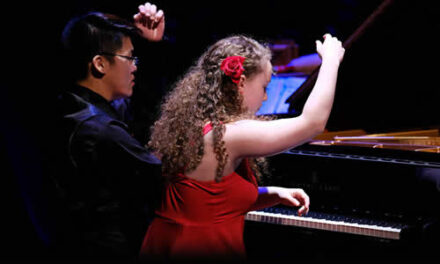The second annual collaborative concert featuring the Durham Symphony Orchestra and John Brown’s “Little” Big Band, celebrating the life and work of Martin Luther King, Jr., was presented in Duke’s venerable (and recently-renovated) Page Auditorium, where King himself spoke, back in 1964. (A photo of him at the podium on that very stage served as the backdrop, literally, for the program.)
The guest vocalist was René Marie, a remarkable artist whose work on this occasion paid eloquent and often moving tribute to the late Natalie Cole and her father.
The distinguished narrator was Keith Snipes, whose stirring performances and remarks at last year’s concert were among its highlights.
The entire event, “Sounds of Justice & Inclusion Honoring Rev. Dr. Martin Luther King, Jr.,” was sponsored by Duke and introduced by Benjamin D. Reese, who urged attendees to return for remaining events on the university’s busy calendar for the weekend.
The national anthem, led by the DSO’s music director, William Henry Curry got things off to a fine start.
The little band – the 12 members of which produce hall-filling sound and then some – then launched the mixed jazz and orchestral evening with a splendidly vibrant rendition of “Lulu’s Back in Town” in which were heard the first of numerous outstanding solos from members of this virtuoso ensemble. There were many more as the evening unfolded – stellar contributions from the trumpets, trombones, saxes, pianist, guitarist, drummer, and of course Brown himself, one of the superior bassists and band leaders in the Southeast. The first of two groups featuring René Marie – embracing the stem-winder that was (on this occasion) “Avalon,” an unforgettable rendition of “Unforgettable,” and “Orange Colored Sky” – demonstrated the singer’s vocal radiance and masterful understanding of the material. Part two of the concert brought her back for the great buzzard-and-monkey song “Straighten Up and Fly Right” plus “What a Difference a Day Makes” and “Route 66” (with some enjoyable audience participation). She’s quite remarkable, in part because she has a fabulous voice and outstanding diction but also because she really sings, concurrently styling the songs in ways that the late Natalie Cole herself would surely have both recognized and appreciated. And along the way there were numerous solos from the band, solos that underscored and mirrored the singer’s emotions and moods. This may have been her first appearance with this ensemble but surely it will not be her last!
The orchestral portions of the evening were interspersed here and there. The first of these contributions was the world premiere of a revision of “I Have a Dream,” from Bill Robinson‘s Birthday Symphony, the birthday being MLK’s (but also the composer’s own). This is warm, melodious, engaging fare, richly varied in terms of orchestration and wide-ranging in emotional content. This ten-minute section made very favorable impressions and was enthusiastically received by the audience. (The entire work will be performed by the Raleigh Symphony in two back-to-back concerts on Feb. 26 and 27, at Meredith College.)
Aaron Copland’s Lincoln Portrait capped the first part of the program, with Snipes reading from the 16th president’s words and the DSO providing some of our nation’s most moving and powerful music. This “big band” sounded very much like the greatest of our orchestras in this score, the playing fervent and deeply felt. Portions of the work, particularly in the lively second section, are downright Ivesian, which means that, whether this was a “first hearing” or a welcome return for listeners already familiar with the piece, there were delights aplenty.
Part two began with a solo turn for the little band: a captivating reading of Bobby Timmons’ “Moanin’.” The orchestra then took up Morton Gould’s “Hymnal,” from American Ballads; the tune is the anthem of the Civil Rights era, “We shall overcome,” in a gorgeous setting that makes one wish to hear the rest of this set.
At the end of René Marie’s second group, Snipes recited MLK’s own remarks on jazz as delivered in Berlin in 1964, here lightly and insightfully accompanied by members of the little band playing music by Miles Davis. This speech is prayer-like, and it made a big impact. (Read it here and you will get some idea of just how meaningful this part of the program was.)
Curry then introduced the evening’s two final numbers, speaking from the heart (as he had already done several times during this concert). Both were played by the combined little and big bands – Brown’s and the DSO. The first was Duke Ellington’s last composition, a tribute to MLK, penned on the master’s deathbed.* This is somber fare, and it might well have served as an appropriate finale for this evening of tributes and reflections, but there was more, as the two ensembles tore into Satchmo!, a tribute to Louis Armstrong, introduced by Curry with comments about the great man’s own activism, particularly at the time of the Little Rock schools standoff. The big tunes were all there in this compact medley, and – with trumpeter Charlton Singleton portraying Satchmo – the sheer joy of Armstrong’s life in music served as a buoyant cap for this generous tribute to the great Americans whose life and work the concert celebrated.
***
West Campus is not a wonderful place for parking (or access to venues, for that matter), but on this first evening of the long MLK holiday weekend, Duke played its usual money-grubbing trick, keeping the circle in front of the Chapel closed to traffic and thus forcing patrons into the for-pay deck – followed by a substantial hike to Page. Here’s hoping this concert will revert to Baldwin next time!
*Curry also paid tribute to Billy Strayhorn, Ellington’s right-hand-person and author of many “Ellington” hits; we claim Strayhorn as one of our own, since he spent many of his childhood years in Hillsborough!











